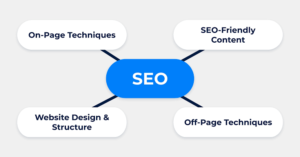Introduction to Search Engine Optimization (SEO)
Search Engine Optimization, commonly referred to as SEO, is a multifaceted digital marketing strategy aimed at enhancing the visibility and ranking of websites in search engine results pages (SERPs). As users increasingly rely on search engines to find information, products, and services, effective SEO practices become essential for businesses seeking to attract targeted traffic. The primary goal of SEO is to ensure that a website appears at the top of search results when relevant keywords are queried, ultimately driving organic traffic that leads to conversions and increased revenue.

The significance of SEO in digital marketing cannot be overstated. A well-optimized website not only improves its visibility in search engines like Google and Bing, but it also fosters credibility and trust among potential customers. When users encounter a website listed high in search results, they are more likely to perceive it as a reputable source of information or a reliable service provider. Consequently, investing in SEO becomes crucial for businesses wanting to establish a strong online presence and keep ahead of the competition.
This blog post aims to provide a comprehensive overview of SEO, starting from the fundamental concepts to advanced techniques. Readers can expect to learn about various aspects of SEO, including keyword research, on-page and off-page optimization, technical SEO, and the tools available to assist in these endeavors. Furthermore, the discussion will encompass the costs associated with implementing effective SEO strategies and the potential return on investment that can be achieved through diligent practices. By delving into these topics, we will illustrate how effective SEO practices can not only drive traffic but significantly enhance website rankings, leading to long-term success in the digital marketplace.
WordPress Website Design and Development: Benefits, Limitations, and Key Statistics
SEO Tools for Ranking Your Website
In the ever-evolving landscape of digital marketing, utilizing effective SEO tools has become paramount for enhancing website rankings. These tools facilitate various aspects of search engine optimization, providing insights that help marketers strategize effectively and achieve their goals. Notably, Google Analytics is a fundamental tool that allows users to track website traffic and user behavior. By analyzing metrics such as bounce rate and session duration, website owners can identify areas for improvement and tailor their content to better meet user needs.
Another powerful tool is SEMrush, known for its comprehensive suite of features that encompass keyword research, competitor analysis, and site auditing. This platform provides valuable data on the keywords driving traffic to competitor sites, enabling marketers to discover opportunities for ranking higher. Additionally, SEMrush’s site audit feature identifies technical issues, which are crucial for maintaining optimal site health.
Moving on, Ahrefs is highly regarded for its robust backlink analysis capabilities. Backlinks play a significant role in determining a website’s authority and ranking. Ahrefs allows users to examine their backlink profile as well as that of competitors, facilitating the development of an effective link-building strategy. Moreover, Ahrefs includes features for keyword exploration, allowing users to discover new keyword opportunities and analyze their performance over time.
Moz, another well-known platform, offers a suite of SEO tools designed to enhance search visibility. Its keyword explorer and page optimization features provide valuable insights for both on-page and off-page optimization strategies. Moz’s community-driven approach also fosters a supportive environment where marketers can exchange knowledge and stay updated on industry trends.
In summary, the integration of these SEO tools—Google Analytics, SEMrush, Ahrefs, and Moz—can significantly enhance your SEO marketing efforts. By leveraging their unique features, website owners can not only improve their rankings but also ensure their strategies are data-driven and effective in the competitive digital landscape.
Understanding On-Page SEO
On-page SEO is a crucial component of search engine optimization that focuses on enhancing individual web pages to improve their rankings on search engine results pages (SERPs). This process involves the strategic optimization of various elements on a webpage, including content, meta tags, and internal linking. Effective on-page SEO begins with thorough keyword research, which is the foundation for identifying the terms and phrases that potential visitors are searching for. By integrating these keywords naturally throughout the content, webmasters can signal to search engines the relevance of their pages.
One of the primary elements of on-page SEO is the use of meta tags, specifically the title tags and meta descriptions. Title tags should be concise, typically under 60 characters, and include the primary keyword. Meta descriptions serve as a brief overview of the content and should be compelling enough to encourage clicks, usually not exceeding 160 characters. Optimizing these tags helps search engines understand the content while also enhancing the click-through rate from the SERPs.
Content optimization is another vital aspect of on-page SEO. This involves creating high-quality, informative, and engaging content that meets the needs of users. Utilizing headers and subheaders (H1, H2, etc.) can enhance readability and structure the content logically. Additionally, maintaining an appropriate keyword density—ensuring keywords are present but not excessively so—can improve the page’s visibility without risking penalties for keyword stuffing.
Internal linking, which refers to linking to other pages within the same website, plays a significant role in guiding users and search engines through the site. Creating a robust internal linking structure not only helps distribute page authority but also improves user experience by aiding navigation. Overall, mastering these on-page SEO elements can significantly elevate a website’s search engine performance and user engagement levels.

Mastering Off-Page SEO
Off-page SEO is an essential aspect of search engine optimization that focuses on enhancing your website’s authority and relevance through external factors. One of the most significant elements of off-page SEO is the acquisition of quality backlinks. Backlinks act as endorsements for your content, signaling to search engines that your website is trustworthy and valuable. To effectively build these links, one must engage in various strategies such as guest blogging, reaching out to influencers in your niche, and creating high-quality, shareable content that naturally attracts links.
Furthermore, social media engagement plays a pivotal role in off-page SEO. By actively participating in social networks, businesses and individuals can drive traffic to their websites while also enhancing their online visibility. Regularly sharing informative and engaging content on platforms like Facebook, Twitter, and LinkedIn can help in creating a loyal audience that is more likely to link back to your website. It is also beneficial to interact with followers, respond to comments, and participate in relevant discussions to build a community around your brand.
Additionally, brand building is crucial for off-page SEO. A strong brand can lead to greater recognition and authority, ultimately resulting in more backlinks and traffic. Investing in public relations, engaging with your audience through email newsletters, and collaborating with other brands can further solidify your brand presence online. Creating a consistent brand message and utilizing various channels for outreach can elevate your branding efforts. Therefore, mastering off-page SEO encompasses not just link building but also harnessing the power of social media and brand development to create a well-rounded online presence.

Global SEO Costs for Website Ranking
Understanding the costs associated with Search Engine Optimization (SEO) is crucial for businesses aiming to enhance their online presence. The expenses related to SEO services can vary significantly across different regions, influenced by several factors. Firstly, the scope of services required plays a pivotal role in determining costs. Businesses seeking comprehensive packages that include keyword research, on-page optimization, link building, and content creation may incur higher expenses compared to those opting for limited services.
In addition to the scope of services, the competitiveness of the industry also impacts pricing. Sectors with high competition, such as finance or e-commerce, typically require more investment to achieve and maintain favorable rankings on search engine results pages (SERPs). SEO professionals may need to employ advanced strategies and tools, leading to increased costs in these competitive environments. Conversely, businesses in niche markets may find that SEO services are more affordable due to lower competition.
Moreover, the experience and expertise of the SEO providers significantly influence pricing structures. Established firms with a proven track record may charge premium rates for their services. However, they often bring valuable insights and strategies that can yield substantial returns on investment. Location can also affect costs, with countries characterized by a higher cost of living charging more for SEO services compared to regions with lower living expenses.
Furthermore, businesses must consider the ongoing nature of SEO. Unlike one-time advertising efforts, good SEO practices require continual investment and adaptation to changing algorithms and market trends. Therefore, it’s essential for companies to budget for long-term SEO efforts, considering both initial setup costs and ongoing maintenance expenses. A clear understanding of these factors can help organizations make informed decisions regarding their SEO investments.
The Impact of SEO on Different CMS: PHP, MERN, Python, and More
Search Engine Optimization (SEO) practices are not uniform across various Content Management Systems (CMS). Each system—be it PHP, MERN (MongoDB, Express.js, React, Node.js), or Python frameworks—presents unique opportunities and challenges that can significantly affect the implementation and success of SEO strategies. Understanding these differences is crucial for optimizing your website effectively.
PHP, being one of the oldest and most widely used programming languages, offers a plethora of well-established SEO tools and plugins. Popular platforms such as WordPress, which is built on PHP, enable users to leverage built-in SEO features like permalinks, sitemaps, and responsive design. However, challenges can arise due to the level of customization involved; poorly structured themes or plugins could hinder optimal indexing and site speed, both of which are vital factors in SEO.
The MERN stack, on the other hand, utilizes JavaScript technologies that are less traditional in terms of SEO. Single Page Applications (SPAs), common in this stack, can pose significant challenges because search engines may struggle to crawl dynamic content. To mitigate this risk, developers often employ server-side rendering (SSR) or pre-rendering techniques to ensure that vital content is accessible to search engines, thus optimizing visibility.
Python frameworks, such as Django or Flask, stand out for their robust backend capabilities and flexibility. These frameworks allow developers to design clean and SEO-friendly URLs effortlessly. However, the heavy reliance on developers can sometimes lead to SEO oversight if best practices are not documented and shared across teams. Ensuring that essential elements like meta tags and rich snippets are correctly configured is vital to maximizing SEO potential.
In essence, while each CMS has its specific strengths and challenges regarding SEO, successful optimization relies on understanding these factors and implementing tailored solutions for each platform.
Understanding Mobile Application Development Costs: A Comprehensive Guide
Measuring SEO Success: Key Performance Indicators (KPIs)
Measuring the success of search engine optimization (SEO) efforts is critical for understanding the effectiveness of strategies employed. Various key performance indicators (KPIs) can be utilized to gauge SEO success. Among them, organic traffic stands as one of the most significant metrics. This shows the number of visitors arriving at a website via unpaid search results, reflecting the overall visibility and relevance of the site in search engines. Tools like Google Analytics can help in tracking this metric efficiently.
Another essential KPI to monitor is keyword rankings. This involves understanding how well a website ranks for specific keywords and phrases within search engine results. Regularly tracking these rankings enables businesses to assess which keywords are driving traffic and which ones require additional focus. Various SEO tools, such as SEMrush or Moz, can provide valuable insights into these rankings, allowing for strategic adjustments to improve visibility.
Conversion rates also serve as a vital indicator of SEO success. This metric reflects the percentage of visitors who complete a desired action on the site, such as making a purchase or signing up for a newsletter. By analyzing conversion rates, businesses can determine whether their SEO efforts are effectively attracting the right audience and driving desired actions. A/B testing can be a useful method in optimizing conversion rates related to different landing pages or content strategies.
Furthermore, monitoring bounce rates, which indicate the percentage of visitors who leave a site after viewing only one page, is essential. A high bounce rate may suggest that the landing pages do not provide the content or experience that visitors expect. By analyzing bounce rates, companies can identify areas that might need improvement to keep users engaged. By effectively tracking and analyzing these KPIs, businesses can continuously improve their SEO strategy, leading to enhanced online performance.
Common SEO Mistakes to Avoid
Search Engine Optimization (SEO) plays a crucial role in enhancing the visibility of a website. However, many website owners fall prey to common mistakes that can significantly impede their ranking efforts. One of the most prevalent mistakes is keyword stuffing. This practice involves overloading a webpage with an excessive number of keywords in an attempt to manipulate search engine rankings. While it may seem beneficial, keyword stuffing often leads to awkwardly written content and can result in penalties from search engines, ultimately lowering the website’s performance.
Another critical error in SEO practices is neglecting mobile optimization. With a significant portion of web traffic coming from mobile devices, it is essential for websites to be optimized for mobile use. A lack of mobile-friendly design can lead to poor user experience, increased bounce rates, and reduced rankings in search engine results. Ensuring that your site is responsive and accessible on various devices will contribute positively to your SEO strategy.
Ignoring SEO analytics is also a common misstep that can adversely affect a website’s performance. SEO analytics allows you to monitor your website’s traffic, user behavior, and the effectiveness of your SEO strategies. By failing to analyze this data, website owners miss valuable insights that could inform their content and marketing strategies. Regularly reviewing and interpreting SEO analytics can identify areas for improvement, helping to fine-tune your approach for better results.
It is vital to recognize these common pitfalls to develop an effective SEO strategy. By avoiding keyword stuffing, ensuring mobile optimization, and regularly engaging with SEO analytics, website owners can enhance their site’s performance and enjoy better search engine rankings.
Future Trends in SEO
The landscape of search engine optimization (SEO) is constantly evolving, largely influenced by technological advancements and changing user behaviors. One of the most significant trends reshaping SEO in recent years is the rise of voice search. With the proliferation of smart speakers and voice-activated devices, consumers are increasingly relying on voice commands to perform searches. This shift requires businesses to optimize their content for conversational queries and natural language processing, ensuring that they remain relevant in voice-driven search results.
In conjunction with voice search, the integration of artificial intelligence (AI) into search algorithms is revolutionizing how search engines determine content relevance. AI tools can analyze vast amounts of data, helping search engines understand user intent more accurately. As AI continues to develop, SEO strategies will need to adapt, focusing more on user experience and content quality rather than just keyword frequency. Providing valuable, informative content that meets the expectations of users will be essential for any successful SEO strategy moving forward.
Machine learning also plays a pivotal role in the future of SEO by enhancing the personalization of search results. As search engines gather more data on user behaviors, they begin to tailor search results to individual preferences, which further emphasizes the need for businesses to understand their target audience deeply. Implementing strategies that focus on user engagement and satisfaction will not only improve rankings but also foster brand loyalty.
To stay ahead in this competitive digital landscape, businesses must embrace these emerging trends and technologies in SEO. By optimizing for voice search, leveraging AI insights, and prioritizing user experience, organizations can position themselves for long-term success in a rapidly changing environment. Keeping a vigilant eye on technological advancements and adjusting strategies accordingly will be critical for maintaining a competitive edge in the field of SEO.
Understanding Mobile Application Development Costs: A Comprehensive Guide


